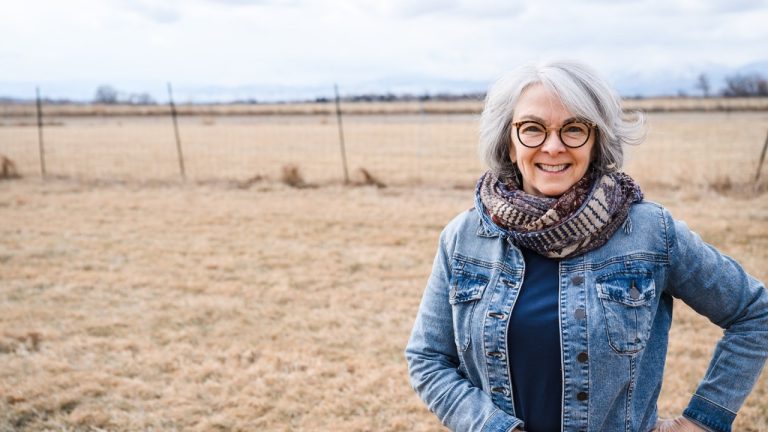
Excerpt from article in Michigan Voyager, Spring 2024
I grew up in Michigan and moved to Colorado for college. I love the great lakes, and I love the mountains. I have always felt a call towards end-of-life work, but never knew what that might exactly mean.
My training and background is in teaching, so combining teaching and the subject of death has been a natural mid-life career change. I think it may have surprised some folks in my life, but it was not surprising to me, as it combined my skills, interests and passions in one place.
As an end-of-life guide and death doula, I connect with purpose and meaning in my life every single day. What was a surprise to me was when my brother suggested I start a podcast. I honestly had never listened to a podcast at that point, although I knew what one was, and I certainly didn’t know what it would entail to create one. He said, “Come on, you ask great questions, and you love to talk to people — just try it!”
I literally made my first episode the next day and have been mad for it ever since. It combines so many things that I enjoy, including talking with people who have something important to share, synthesizing the gems that fall out of their mouths, and amplifying the message that conversations about death make a difference.
As one of my colleagues and mentors, Dr. Sarah Kerr, says: “We can do death better.” I believe that with all my heart, and I think “doing death better” begins by talking about it with an open heart and an open mind.
The biggest challenge by far is that I am swimming upstream to bring the topic of death to the forefront of conversations. We tend to be a society that does not talk directly about death, end of life or grief. Yet I see over and over again the value of having conversations with our loved ones, with our friends, and with our wider communities about these very topics and the many issues that surround them.
One of my favorite parts from the excellent book “Being Mortal” by Atul Gawande is when he talks about exploring a small, northern Midwestern town. In this town, the doctors who all knew each other had gotten together and decided to create a uniform “conversation starter” for all patients over a certain age. This meant that all the physicians in the town agreed that they would hand this questionnaire to their patients at routine visits, and as a result, the doctors and their patients had had a number of conversations about what people hoped for at the end of life, long before folks got there.
The results were striking. What they found was that yes, conversations made a difference — in how patients responded to aging, what interventions they chose and were offered, and who was inhabiting the ICU in that small town. I think this is a fascinating example of how simply bringing up the subject of dying impacts healthcare choices, our experiences with the medical system, and even bottom-line costs for the medical systems and for families.
So, struggle to change the cultural narrative — that’s the biggest challenge. Other than that, I had to learn a lot of new tech for this work. From the details of Zoom rooms to editing my podcast in Garageband… it has been Next Level Tech for this middle-aged lady!
I typically introduce myself as a death doula, end-of-life guide, and podcaster, and let me tell you — these terms are a conversation starter! And then I tell them my work is called Best Life Best Death, because I believe that facing our death helps us to find out what matters most in our life.
In this work I offer presentations, teach classes and coach individuals, but the most unique thing I do by far is the Best Life Best Death podcast. I am known for my casual, conversational approach to interviews with my unique guests, and listeners enjoy the weekly 30-minute length. Guests often remark what an easy interview they have with me, because I am truly curious, and I listen deeply to what they have to say.
In addition to the easy-to-listen-to-style, I think what’s a joy about the podcast is that I have such a wide range of topics and guests, from New York Times best-selling authors to family friends who’ve had powerful death experiences to share. I’ve had well-known musicians who play songs for us, and I’ve had hospice nurses who’ve been experts in their field for over 50 years. Each episode is filled with genuine conversation, and my hope is that listeners take something unexpected away from each week. I’ve recently been putting most episodes up on Youtube, for those who prefer video, and this is where you see the real behind-the-scenes bloopers that I edit out of the audio version!
When I work with individuals, couples, and families, this is the most intimate and personalized type of education that I do. This coaching can take place in person or over Zoom, and it includes helping someone plan for their end when they have a terminal diagnosis or simply being more prepared and organized by reflecting on what dying means to them, although they are not necessarily dying any time soon.
I find that when someone can create their own relationship to what is unfolding, despite the outcome they see ahead of them, it changes how they walk that path. Death may be inevitable, but how you approach it can take many different forms. I help clients figure out what their path is and what truly matters to them.
Contact Info:
• Website: https://bestlifebestdeath.com
• Instagram: @bestlifebestdeath
• Facebook: @bestlifebestdeath
• Linkedin: https://www.linkedin.com/company/best-life-best-death
• Twitter: https://twitter.com/BestLife_Death
• Youtube: https://www.youtube.com/@bestlifebestdeath

End of Life Doula, Podcaster, and founder of Best Life Best Death.